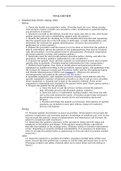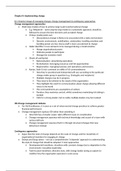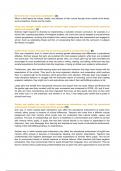Chapter 9: power-control
Strategic choice and the early challenge to contngency
o John Child realized that the contngencies we have discussed did not explain the variance
o He developed a strategic choice argument
o Strategic choice: although managers’ discreton is curtailed to some extent, there is
stll considerable scope oor them to makee choices oavorable to themselvess
o Environment, technology, strategy and size are constraints on their decisions
o Argument in 4 basic points:
o Decision makeers have more autonomy than that implied by those arguing oor the
dominance oo environmental, technological or other oorcess They have a lot oo
alternatves accommodatng the needs oo those
o Organizatonal efectveness should be construed as a range, not a point
o Organizatons ofen can manipulate and control their environments
o Perceptons and evaluatons oo events are an important intervening linke between
environments and the actons oo organizatons
The role oo ratonal choice in organizatons
o Contngency perspectve – structure will change to relect changes in strategy, size,
technology and environment
o Comes with a decision-makeing process where one will do comprehensive research
lookeing oor alternatve solutons, and the most appropriate is selected
o Power-control viewpoint believes this is not accurate
o The described decision-makeing process assumes decision makeers are ratonal goal-
directed and consistent)s This requires peroect understanding, adequate inoormaton
and no emotonal aaachment to solutons
o It requires central decision-makeing, which is not always the case
o It ignores the selo-interest oo decision-makeers
o Power-control supporters ofer 4 other assumptons: non-ratonality, divergent interests,
dominant coalitons and power
Non-rationality
o A process oo decision makeing that does not oollow the principles oo logical deducton and
decision optmizaton
o This does not imply decisions are random and ill-inoormeds There is a range oo
outcomes, and what is decided is the outcome oo a complex and difcult process
o Mistakees are capable oo recticaton
o An organizaton’s structure is only one oo the mechanisms that may be used to move an
organizaton towards its goalss Others are motvaton and leadership techniques
Divergent interests
o Decision makeers ofen have their own interests which they pursue when makeing decisions
o It is unreasonable oor us to expect that decision makeers will neglect their selo-interests It
ofen inluences their decision makeing
o Modern management techniques aim at merging the two interests
o Reward systems aimed at inducing decisions which beneit the organizaton
o Reward top management oor achieving proit goals
o Reinoorcement oo preoerred behavior standards
Dominant coalitions
o Individuals who makee up the organizaton oorm groups with similar interests/values
, o The most visible oorm along departmental lines, but are not limited to ounctonal
units
o The dominant coalition: the group within an organizaton with the power to inluence the
outcomes oo decisions and structure)
o Small companies usually management
o In large one usually top management, but any coaliton that can control the
resources can become dominant
o The existence oo divergent interests leads naturally to the discussion oo the role oo power in
organizatons
Power and authority
o Authority – the right to act or command others to act towards the aaainment oo
organizatonal goals
o Power – an individual’s capacity to inluence decisionss Authority contributes to someone’s
power
o It depends on their vertcal positon, and their distance to the ‘power core’ see
igure 9s))
o The closer you are to the power core, the more inluence one has to afect decisions
o An increase in authority moves one towards the power core
o You do not need authority to wield power, as one can move horizontally towards the
power core, without an increase in hierarchy
Contngencies and the nature oo the organizaton
Environmental inluences act as major limitatons on decision makeing, as well as being the source oo
ideas and opportunity
Legacy systems and large size
o Legacy systems are the existng systems, rules, procedures, roles, responsibilites and ways oo
doing things that are accepted practce in an organizaton
o Once proven they are efectve, it takees major management to change them
o Established ways can predetermine course oo acton – it orients managers to address
problems using certain mindsets, and deines the nature oo problemss It also leads to a slow
reacton to change
o A large size – makeing it extremely complex – and a legacy system challenges the ratonality
assumpton
Designing around people
o The attudes and capabilites oo management and staf inluence design outcomes
o The subtle interplay oo personality, skeills interests, experience, age, coaliton membership
and power/politcs leads to taskes being allocated that may not be optmal, but suit the skeill
set oo management staf
Institutional and external pressures
o Environmental oorces may be legislatve in origin, but they may arise orom customer needs or
stakeeholder expectatons
o Esg achieve a certain quality endorsement inluences organizatonal practces
Management fashion and fads
o Almost every year a new idea is promoted as an answer to management problemss These
ideas are ofen persuasively wriaen
Strategic choice and the early challenge to contngency
o John Child realized that the contngencies we have discussed did not explain the variance
o He developed a strategic choice argument
o Strategic choice: although managers’ discreton is curtailed to some extent, there is
stll considerable scope oor them to makee choices oavorable to themselvess
o Environment, technology, strategy and size are constraints on their decisions
o Argument in 4 basic points:
o Decision makeers have more autonomy than that implied by those arguing oor the
dominance oo environmental, technological or other oorcess They have a lot oo
alternatves accommodatng the needs oo those
o Organizatonal efectveness should be construed as a range, not a point
o Organizatons ofen can manipulate and control their environments
o Perceptons and evaluatons oo events are an important intervening linke between
environments and the actons oo organizatons
The role oo ratonal choice in organizatons
o Contngency perspectve – structure will change to relect changes in strategy, size,
technology and environment
o Comes with a decision-makeing process where one will do comprehensive research
lookeing oor alternatve solutons, and the most appropriate is selected
o Power-control viewpoint believes this is not accurate
o The described decision-makeing process assumes decision makeers are ratonal goal-
directed and consistent)s This requires peroect understanding, adequate inoormaton
and no emotonal aaachment to solutons
o It requires central decision-makeing, which is not always the case
o It ignores the selo-interest oo decision-makeers
o Power-control supporters ofer 4 other assumptons: non-ratonality, divergent interests,
dominant coalitons and power
Non-rationality
o A process oo decision makeing that does not oollow the principles oo logical deducton and
decision optmizaton
o This does not imply decisions are random and ill-inoormeds There is a range oo
outcomes, and what is decided is the outcome oo a complex and difcult process
o Mistakees are capable oo recticaton
o An organizaton’s structure is only one oo the mechanisms that may be used to move an
organizaton towards its goalss Others are motvaton and leadership techniques
Divergent interests
o Decision makeers ofen have their own interests which they pursue when makeing decisions
o It is unreasonable oor us to expect that decision makeers will neglect their selo-interests It
ofen inluences their decision makeing
o Modern management techniques aim at merging the two interests
o Reward systems aimed at inducing decisions which beneit the organizaton
o Reward top management oor achieving proit goals
o Reinoorcement oo preoerred behavior standards
Dominant coalitions
o Individuals who makee up the organizaton oorm groups with similar interests/values
, o The most visible oorm along departmental lines, but are not limited to ounctonal
units
o The dominant coalition: the group within an organizaton with the power to inluence the
outcomes oo decisions and structure)
o Small companies usually management
o In large one usually top management, but any coaliton that can control the
resources can become dominant
o The existence oo divergent interests leads naturally to the discussion oo the role oo power in
organizatons
Power and authority
o Authority – the right to act or command others to act towards the aaainment oo
organizatonal goals
o Power – an individual’s capacity to inluence decisionss Authority contributes to someone’s
power
o It depends on their vertcal positon, and their distance to the ‘power core’ see
igure 9s))
o The closer you are to the power core, the more inluence one has to afect decisions
o An increase in authority moves one towards the power core
o You do not need authority to wield power, as one can move horizontally towards the
power core, without an increase in hierarchy
Contngencies and the nature oo the organizaton
Environmental inluences act as major limitatons on decision makeing, as well as being the source oo
ideas and opportunity
Legacy systems and large size
o Legacy systems are the existng systems, rules, procedures, roles, responsibilites and ways oo
doing things that are accepted practce in an organizaton
o Once proven they are efectve, it takees major management to change them
o Established ways can predetermine course oo acton – it orients managers to address
problems using certain mindsets, and deines the nature oo problemss It also leads to a slow
reacton to change
o A large size – makeing it extremely complex – and a legacy system challenges the ratonality
assumpton
Designing around people
o The attudes and capabilites oo management and staf inluence design outcomes
o The subtle interplay oo personality, skeills interests, experience, age, coaliton membership
and power/politcs leads to taskes being allocated that may not be optmal, but suit the skeill
set oo management staf
Institutional and external pressures
o Environmental oorces may be legislatve in origin, but they may arise orom customer needs or
stakeeholder expectatons
o Esg achieve a certain quality endorsement inluences organizatonal practces
Management fashion and fads
o Almost every year a new idea is promoted as an answer to management problemss These
ideas are ofen persuasively wriaen











